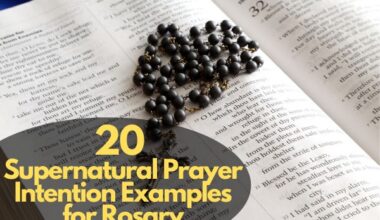Table of Contents Show
In a world filled with uncertainties, many individuals seek solace in the act of prayer. Whether it’s a traditional religious practice or a personal form of meditation, the act of prayer has long been considered a source of comfort and strength for countless people.
While some claim that prayer has the potential to influence their lives significantly, others remain skeptical about its efficacy. Positive believers affirm that prayer has the power to bring about positive changes, while doubters express reservations about its impact. This article looks into the multifaceted nature of prayer, exploring its potential significance and addressing the question, “Prayer Does It Make Any Difference?”
Prayer Does It Make Any Difference?
Prominent spiritual leaders and scholars have offered valuable insights into the significance of prayer in the human experience. Many emphasize the transformative power of prayer in fostering a sense of connection with the divine and promoting a deeper understanding of one’s purpose in life. Their teachings often underline the importance of cultivating faith, humility, and gratitude through prayer, promoting a more profound spiritual connection and a sense of inner peace.
Understanding Prayer: A Spiritual Connection Beyond the Physical Realm
Prayer, in its essence, embodies a deep spiritual connection between individuals and a higher power. It serves as a means of communication, introspection, and seeking guidance from a divine source. Whether it involves reciting specific religious verses, expressing gratitude, or simply engaging in silent contemplation, prayer manifests in various forms across different cultures and faiths. Through the act of prayer, individuals often seek comfort, guidance, and reassurance, believing in the potential for divine intervention in their lives.
The Transformative Power of Prayer in Daily Life
Integrating prayer into one’s daily routine can have a profound impact on an individual’s overall well-being. Numerous believers attest to experiencing a sense of inner peace, clarity, and resilience as a result of regular prayer practice. Moreover, many find that prayer serves as a source of emotional solace during challenging times, offering a sense of hope and strength in the face of adversity. Furthermore, some individuals report that prayer cultivates a sense of gratitude and mindfulness, fostering a deeper connection with the self and the world around them.
Prayer and Mental Well-being: Unveiling the Psychological Benefits
Research suggests that prayer can positively influence mental well-being, contributing to reduced stress levels and improved overall emotional health. Engaging in prayer is often associated with a sense of relief and comfort, leading to decreased anxiety and a more positive outlook on life. Additionally, the meditative aspect of prayer has been linked to enhanced mindfulness and increased resilience, aiding individuals in coping with various life challenges.
The Impact of Prayer on Physical Health: Exploring the Mind-Body Connection
While the connection between prayer and physical health is still a topic of ongoing research, some studies have indicated potential benefits. Prayer’s meditative and calming effects are believed to contribute to reduced blood pressure, a lowered heart rate, and improved overall physiological well-being. Furthermore, the cultivation of a positive mindset through prayer is thought to have a beneficial impact on the body’s immune system, promoting overall health and well-being.
Prayer Does It Make Any Difference? Personal Testimonials Speak
Countless individuals have shared their personal testimonials regarding the transformative impact of prayer in their lives. From overcoming personal challenges to finding inner strength during difficult times, many attribute their resilience and positive outlook to their unwavering faith and practice of prayer. These personal narratives highlight the significant role that prayer plays in fostering emotional well-being, resilience, and a sense of spiritual connection.
Challenges to Belief in the Efficacy of Prayer
Despite the widespread belief in the power of prayer, some individuals remain skeptical about its efficacy. Critics often question the tangible outcomes of prayer, emphasizing the importance of taking practical action to bring about change. Additionally, some argue that the unpredictable nature of life challenges the notion of an interventionist higher power, leading to doubts about the impact of prayer on life events.
Embracing Prayer as a Source of Strength and Guidance
Regardless of differing viewpoints, prayer continues to serve as a profound source of strength, guidance, and solace for countless individuals worldwide. Whether practiced as a religious ritual, a form of meditation, or a personal expression of faith, prayer has the potential to foster a deeper connection with the self, others, and the divine. Embracing prayer as a part of one’s daily life can lead to a heightened sense of purpose, resilience, and inner peace.
Understanding the Essence of Prayer
At its core, prayer is more than just a recitation of words or a ritualistic routine; it is a form of spiritual dialogue that fosters a deep connection with the divine, the universe, or the inner self. It can take the form of formalized prayers, spontaneous conversations, or silent reflections, allowing individuals to express their innermost thoughts, desires, and fears in a sacred space of introspection and vulnerability.
Exploring Different Types of Prayer Practices
Prayer manifests in various forms, catering to the diverse spiritual needs and preferences of individuals. Vocal prayers, commonly found in religious settings, involve the recitation of specific texts or verses, serving as a communal expression of devotion and unity. On the other hand, meditation and contemplative prayer focus on cultivating inner peace, mindfulness, and a heightened sense of spiritual awareness through silence and reflection.
The Science Behind Prayer: Unveiling the Research Findings
While the spiritual significance of prayer is deeply ingrained in religious traditions, scientific research has also looked into its potential impact on mental, emotional, and physical well-being. Studies have revealed intriguing connections between prayer and positive psychological outcomes, shedding light on the potential therapeutic benefits of this age-old practice.
Analyzing the Psychological Benefits of Prayer
Prayer has been shown to have a profound impact on mental health, contributing to the reduction of stress and anxiety and fostering a sense of emotional well-being. By creating a space for self-reflection and gratitude, prayer enables individuals to find solace and inner peace amidst life’s challenges, fostering a resilient mindset and a positive outlook.
Examining the Role of Prayer in Spiritual Growth and Connection
Beyond its psychological implications, prayer plays a crucial role in nurturing spiritual growth and fostering a deeper connection with the divine. It serves as a pathway for individuals to cultivate a sense of purpose, meaning, and transcendence, fostering a profound sense of inner peace and spiritual fulfillment.
Addressing Skepticism: Does Prayer Really Work?
Despite its deep-rooted significance, the efficacy of prayer has often been met with skepticism and doubt. Many question the notion of divine intervention and the occurrence of miracles attributed to prayer. While some view these occurrences as mere coincidences, others interpret them as signs of a higher power at work, challenging the boundaries of scientific understanding and human perception.
Personal Experiences and Testimonials: Impact of Prayer in Real Life
Countless individuals have shared personal experiences and testimonials of the transformative power of prayer in their lives. Stories of healing, redemption, and unexplainable synchronicities serve as a testament to the profound impact of prayer on personal well-being, relationships, and overall life trajectory.
The Role of Rituals and Community in Prayer Practices
In addition to personal prayer, communal rituals and collective prayers play a significant role in fostering a sense of unity, belonging, and shared purpose within religious communities. Group prayers and religious ceremonies serve as a source of social cohesion, offering individuals a sense of belonging and a shared spiritual identity.
Prayer in a Modern World: Its Relevance and Adaptation
In an ever-evolving and interconnected world, the practice of prayer continues to adapt to the changing needs and dynamics of contemporary society. While traditional forms of prayer remain prevalent, new adaptations and innovative approaches have emerged, catering to the spiritual needs of diverse communities and individuals seeking a deeper connection with the divine in the midst of modern challenges and complexities.
The Ethical Considerations of Prayer and its Intersection with Morality
Prayer, often intertwined with moral values and ethical principles, prompts individuals to reflect on their actions, intentions, and impact on the world around them. It encourages a sense of responsibility, empathy, and compassion, fostering a moral compass that guides individuals toward making conscious and ethical decisions in their personal and communal lives.
Challenges and Obstacles in Maintaining a Consistent Prayer Practice
Despite its transformative potential, maintaining a consistent prayer practice can present various challenges and obstacles. Busy lifestyles, conflicting priorities, and wavering faith can hinder the regularity and depth of one’s prayer life, prompting individuals to seek creative solutions and personal commitments to nurture a sustainable and meaningful prayer practice.
Frequently Asked Questions About Prayer Does It Make Any Difference?
- How often should one pray to experience its benefits?
- Regular prayer practice can vary for each individual. Finding a frequency that aligns with one’s personal beliefs and lifestyle is key to experiencing its benefits fully.
- Does prayer have a specific time frame for a response to be considered effective?
- The effectiveness of prayer is often perceived differently by individuals. Some believe in immediate responses, while others perceive it as a gradual process, varying based on personal faith and spiritual beliefs.
- Can prayer help in overcoming emotional turmoil and stress?
- Many individuals find solace and comfort through prayer during times of emotional turmoil.
Conclusion
In conclusion, the act of prayer transcends cultural and religious boundaries, serving as a universal means of spiritual connection, comfort, and guidance. Whether seeking solace during challenging times, expressing gratitude for life’s blessings, or cultivating a deeper sense of purpose, prayer remains a powerful and personal practice for many.
Embracing the transformative power of prayer can foster a deeper connection with the self, others, and the divine, ultimately leading to a more fulfilling and purposeful life journey.








